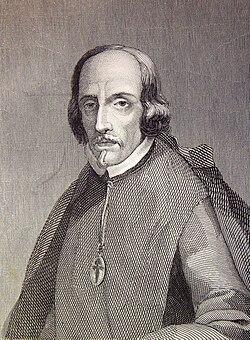Pedro Calderon de la Barca Quote
For, as on the coloured canvasSubtle pencils softly blendDark and light in such proportionsThat the dim perspectives end-Now perhaps like famous cities,Now like caves or misty capes,For remoteness ever formethMonstrous or unreal shapes...So it was, while I alone,Saw their bulk and vast proportionsBut their form remained unknown.First they seemed to us upliftingHigh in heaven their pointed towers,Clouds that to the sea descended,To conceive in sapphire showersWhat they would bring forth in crystal.And this fancy seemed more true,As from their untold abundanceThey, methought, could drink the blueDrop by drop. Again sea monstersSeemed to us the wandering droves,Which, to from the train of Neptune,Issued from their green alcoves.For the sails, when lightly shaken,Fanned by zephyrs as by slaves,Seemed to us like outspread pinionsFluttering o'er the darkened waves;Then the mass, approaching nearer,Seemed a mighty Babylon,With its hanging gardens picturesBy the streamers fluttering down.But at last our certain visionUndeceived, becoming true,Showed it was a great armadaFor I saw the prows cut throughFoam....
For, as on the coloured canvasSubtle pencils softly blendDark and light in such proportionsThat the dim perspectives end-Now perhaps like famous cities,Now like caves or misty capes,For remoteness ever formethMonstrous or unreal shapes...So it was, while I alone,Saw their bulk and vast proportionsBut their form remained unknown.First they seemed to us upliftingHigh in heaven their pointed towers,Clouds that to the sea descended,To conceive in sapphire showersWhat they would bring forth in crystal.And this fancy seemed more true,As from their untold abundanceThey, methought, could drink the blueDrop by drop. Again sea monstersSeemed to us the wandering droves,Which, to from the train of Neptune,Issued from their green alcoves.For the sails, when lightly shaken,Fanned by zephyrs as by slaves,Seemed to us like outspread pinionsFluttering o'er the darkened waves;Then the mass, approaching nearer,Seemed a mighty Babylon,With its hanging gardens picturesBy the streamers fluttering down.But at last our certain visionUndeceived, becoming true,Showed it was a great armadaFor I saw the prows cut throughFoam....
Related Quotes
About Pedro Calderon de la Barca
Calderón de la Barca was born into the minor Spanish nobility in Madrid, where he lived for most of his life. He served as soldier and a knight of the military and religious Order of Santiago, but later became a Roman Catholic priest. His theatrical debut was a history play about the life of King Edward III of England, was first performed on 29 June 1623 at the Royal Alcázar of Madrid, during the surprise visit to Spain of Charles, Prince of Wales to negotiate for a dynastic marriage alliance with the Spanish Habsburgs.
As he continued writing verse dramas, Calderón's favorite theatrical genres included mystery plays illustrating the doctrines of Transubstantiation and the Real Presence for performance during the Feast of Corpus Christi and both comedy of intrigue and tragic theatre rooted in many of the same plot devices as Shakespeare's plays and in ethical dilemmas under the Spanish nobility's code of honour. Born while the unwritten rules of Spanish Golden Age theatre were still being defined by Lope de Vega, Calderón pushed their limits even further by introducing radical and pioneering innovations that are now termed metafiction and surrealism.
His masterpiece, La Vida es Sueño ("Life is a Dream"), combines a beauty and the beast plotline, a disguised woman reminiscent of Viola from Shakespeare's Twelfth Night, surrealist concepts, romantic complications, and the threat of a dynastic civil war, while exploring the philosophical question of whether each individual's fate has already been written without their involvement or if the future can be altered by free will.
Calderón's poetry and plays have since wielded an enormous global influence upon Romanticism, symbolism, literary modernism, expressionism, dystopian science fiction, and even postmodernism. His many admirers have included August Wilhelm Schlegel, Johann Wolfgang von Goethe, John Dryden, Lord Byron, Percy Bysshe Shelley, Fr. Félix Sardà y Salvany, Hugo von Hoffmannsthal, Vyacheslav Ivanov, Jorge Luis Borges, Konstantin Stanislavsky, and Boris Pasternak.
In 1881, the Royal Spanish Academy awarded a gold medal to Irish poet Denis Florence MacCarthy for his highly praised and accurate literary translations of Calderón's verse dramas into English. In 2021, a renewed search for Calderón's missing remains gained media attention worldwide.
